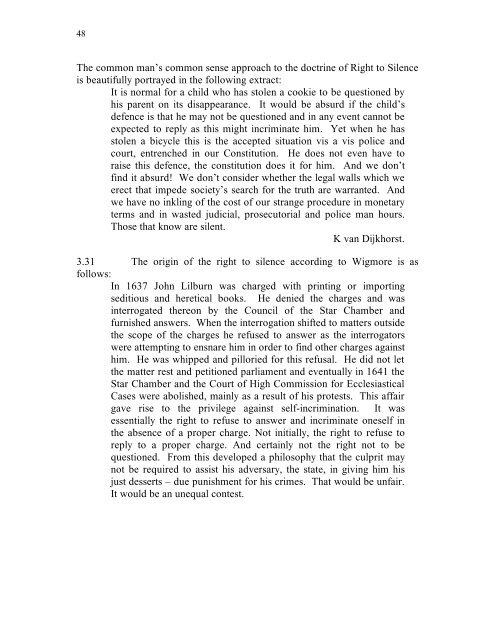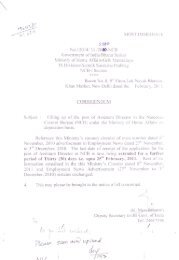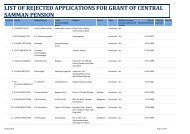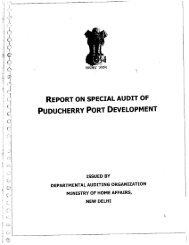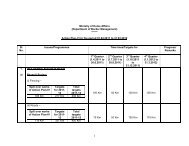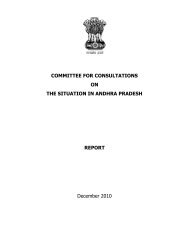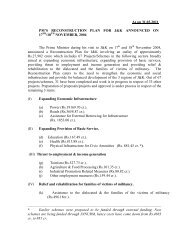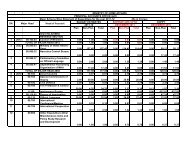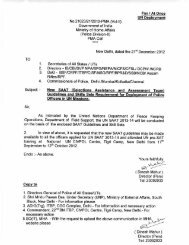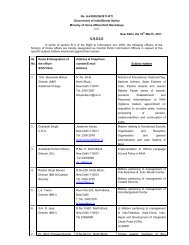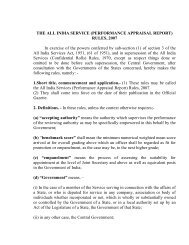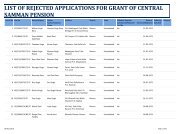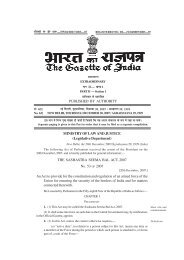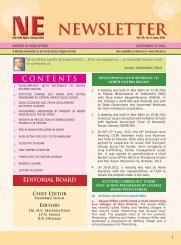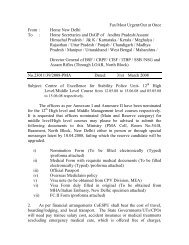- Page 1 and 2:
Committee on Reforms of Criminal Ju
- Page 3 and 4:
Sri C.M. Basavarya Formerly, Distri
- Page 5 and 6: CONTENTS PART - I FUNDAMENTAL PRINC
- Page 7 and 8: ACKNOWLEDGEMENT The nation is grate
- Page 9: PART - I FUNDAMENTAL PRINCIPLES
- Page 12 and 13: 4 vi. To examine the feasibility of
- Page 14 and 15: 6 1.7. The well recognised fundamen
- Page 16 and 17: 8 Orissa, Tamil Nadu, and Uttaranch
- Page 18 and 19: 10 1.18. There was no criminal law
- Page 20 and 21: Sl No 2 12 No. of SLL cases which c
- Page 22 and 23: 14 1.25. Vulnerable sections of the
- Page 24 and 25: 16 1.27. So far as incidence of chi
- Page 26 and 27: 18 Major Frauds Reported During 200
- Page 28 and 29: 20 1.35. Apart from the main functi
- Page 30 and 31: 22 viii. To focus on justice to vic
- Page 32 and 33: 24 doubt and gives the benefit of d
- Page 34 and 35: 26 the inquisitorial system the Jud
- Page 36 and 37: 28 TRUTH AND JUSTICE “Truth does
- Page 38 and 39: 30 2.16.10. Many countries which ha
- Page 40 and 41: 32 grounds of bias and denial of fa
- Page 42 and 43: 34 number of circumstances observed
- Page 44 and 45: 36 2.20.4. In this way, the Judge d
- Page 47 and 48: 39 RIGHT TO SILENCE _ 3.1 The right
- Page 49 and 50: 41 3.6 Burden of Proof in Criminal
- Page 51 and 52: 43 following recommendations to imp
- Page 53 and 54: 45 during investigation or question
- Page 55: 47 Justice and Public Order Act 199
- Page 59 and 60: 51 disclose his defence and upon hi
- Page 61 and 62: 53 Justice and Public Order Act 199
- Page 63 and 64: 55 under Section 5, “to give a de
- Page 65: 57 As quest for truth shall be the
- Page 68 and 69: 60 1. Accused has a right against d
- Page 70 and 71: 62 20. Copies of all the documents
- Page 72 and 73: 64 discretion of Court, on applicat
- Page 74 and 75: 66 its existence unless otherwise p
- Page 76 and 77: 68 5.12 Whereas the civil cases are
- Page 78 and 79: 70 Even regarding the pristine doct
- Page 80 and 81: 72 the jury. The jury consisted of
- Page 82 and 83: 74 fact that the accused is assiste
- Page 84 and 85: 76 6.3 Basically two types of right
- Page 86 and 87: 78 of such liability. Not only the
- Page 88 and 89: 80 examination of witnesses often r
- Page 90 and 91: 82 6.8.9 In 1995 the Indian Society
- Page 92 and 93: 84 (a) legislate to entitle victims
- Page 95 and 96: 87 INVESTIGATION _ 7.1 The primary
- Page 97 and 98: 89 IPC crimes registered an increas
- Page 99 and 100: 91 inefficiency, the members of pub
- Page 101 and 102: 93 work while the rest of the time
- Page 103 and 104: 95 This will be a good training gro
- Page 105 and 106: 97 misconceived service loyalties.
- Page 107 and 108:
99 (i) Test visit to the scene of c
- Page 109 and 110:
101 Districts and other States poli
- Page 111 and 112:
103 Laboratories and about 17 Regio
- Page 113 and 114:
105 7.17 MEDICO LEGAL SERVICES 7.17
- Page 115 and 116:
107 unmindful of the gravity of off
- Page 117 and 118:
109 cognizable, unreasonable burden
- Page 119 and 120:
111 7.22.3 In this context, the Com
- Page 121 and 122:
113 7.24.2 Section 32 of the Preven
- Page 123 and 124:
115 v) the likeli-hood of the perso
- Page 125 and 126:
117 economic crimes such as bank-sc
- Page 127 and 128:
119 police officers themselves to u
- Page 129 and 130:
121 7.32.2 Many times accused are a
- Page 131 and 132:
123 7.35.3 The Committee has made s
- Page 133 and 134:
125 PUBLIC PROSECUTION _ 8.1 The in
- Page 135 and 136:
127 8.6 Separate Directorates of Pr
- Page 137 and 138:
129 8.13 The duties of the Director
- Page 139 and 140:
131 PART - III JUDICIARY
- Page 141 and 142:
133 COURTS AND JUDGES _ 9.1 Huge pe
- Page 143 and 144:
135 9.5.2 Anybody who sits and watc
- Page 145 and 146:
137 evidence governing criminal cas
- Page 147 and 148:
139 and Madhya Pradesh are in favou
- Page 149 and 150:
141 enter immediately below the cau
- Page 151 and 152:
143 9.14.4 At the instance of the S
- Page 153 and 154:
145 TRIAL PROCEDURES _ 10.1 Crimina
- Page 155 and 156:
147 prescribed by S.262 to three ye
- Page 157 and 158:
149 fine through post. He need not
- Page 159 and 160:
151 WITNESSES AND PERJURY _ 11.1 Wi
- Page 161 and 162:
153 are paid allowances on the same
- Page 163 and 164:
155 Thereafter it has to make a com
- Page 165 and 166:
157 VACATIONS FOR COURTS _ 12.1 Non
- Page 167 and 168:
159 vacations for reasonable period
- Page 169 and 170:
161 12.9 The President has fixed 18
- Page 171 and 172:
163 ARREARS ERADICATION SCHEME _ 13
- Page 173 and 174:
165 two years. The High Court shall
- Page 175 and 176:
167 PART - IV CRIME AND PUNISHMENT
- Page 177 and 178:
169 OFFENCES, SENTENCES, SENTENCING
- Page 179 and 180:
171 of the rare case the same can b
- Page 181 and 182:
173 bill had been enacted in 1972 w
- Page 183 and 184:
175 impact of same affects the enti
- Page 185 and 186:
177 fine is concerned it is time th
- Page 187 and 188:
179 than seven years and / or fine
- Page 189 and 190:
181 RECLASSIFICATION OF OFFENCES _
- Page 191 and 192:
183 15.4 Summons and Warrant Cases
- Page 193 and 194:
185 minor offence get labeled as cr
- Page 195 and 196:
187 and judges. They involve import
- Page 197 and 198:
189 OFFENCES AGAINST WOMEN _ 16.1 M
- Page 199 and 200:
191 commit suicide. For the Indian
- Page 201 and 202:
193 Supreme Court the same is not d
- Page 203 and 204:
195 ORGANISED CRIME _ 17.1 The Ency
- Page 205 and 206:
197 of accurate information about t
- Page 207 and 208:
199 with a guarantee of large crimi
- Page 209 and 210:
201 17.16.7 The fact that Organised
- Page 211 and 212:
203 17.17.2 The Government has refe
- Page 213 and 214:
205 3 Ibid 4 Howard Abadinsky, The
- Page 215 and 216:
207 FEDERAL LAW AND CRIMES _ 18.1 O
- Page 217 and 218:
209 constitutional amendments enact
- Page 219 and 220:
211 18.12 Time has come when the co
- Page 221 and 222:
213 TERRORISM _ 19.1 The genesis of
- Page 223 and 224:
215 it under the ordinary penal law
- Page 225 and 226:
217 the former President of India,
- Page 227 and 228:
219 divide and by inducting more fo
- Page 229 and 230:
221 6. Disruptive activities mean a
- Page 231 and 232:
223 effectively defend himself keep
- Page 233 and 234:
225 category and apply the bail pro
- Page 235 and 236:
227 disruptive activities and it wa
- Page 237 and 238:
229 Psychotropic Substances Act, 19
- Page 239 and 240:
231 5. K. Santhanam Sudhir Sreedhar
- Page 241 and 242:
233 ECONOMIC CRIMES _ 20.1 In the e
- Page 243 and 244:
235 i. Definition of new economic o
- Page 245 and 246:
237 20.6 Banking and financial crim
- Page 247 and 248:
239 use of pornography including ch
- Page 249 and 250:
241 been defined earlier. The Serio
- Page 251 and 252:
243 possible, the Court should have
- Page 253 and 254:
245 20.22 SELF-REGULATION, REPORTIN
- Page 255 and 256:
247 PART-IV LOOKING AHEAD
- Page 257 and 258:
249 EMERGING ROLE OF THE LEGAL PROF
- Page 259 and 260:
251 by any manner or means but by a
- Page 261 and 262:
253 TRAINING - A STRATEGY FOR REFOR
- Page 263 and 264:
255 training agenda and will requir
- Page 265 and 266:
257 aimed at. The training results
- Page 267 and 268:
259 VISION FOR BETTER CRIMINAL JUST
- Page 269 and 270:
261 and cooperate with the police.
- Page 271 and 272:
263 PART - VI RECOMMENDATIONS
- Page 273 and 274:
265 RECOMMENDATIONS _ 1. NEED FOR R
- Page 275 and 276:
267 issue directions to the investi
- Page 277 and 278:
269 (ii) The points for determinati
- Page 279 and 280:
271 c) To know the status of invest
- Page 281 and 282:
273 iv. Grave and sensational crime
- Page 283 and 284:
275 (25) Preparation of Police Brie
- Page 285 and 286:
277 without warrant” and for the
- Page 287 and 288:
279 iii) Remaining 50% of the posts
- Page 289 and 290:
281 (65) (i) In the Supreme Court a
- Page 291 and 292:
283 First Class to exercise the pow
- Page 293 and 294:
285 (86) The Judge should be vigila
- Page 295 and 296:
287 on priority basis. The arrears
- Page 297 and 298:
289 (104) The Committee recommends
- Page 299 and 300:
291 operates against the interest o
- Page 301 and 302:
293 The Committee recommends that:
- Page 303 and 304:
295 (139) The sunset provision of P
- Page 305 and 306:
297 (150) For tackling serious econ


